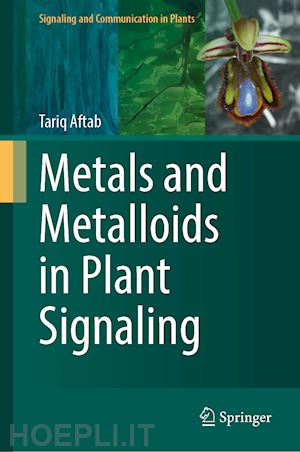
Questo prodotto usufruisce delle SPEDIZIONI GRATIS
selezionando l'opzione Corriere Veloce in fase di ordine.
Pagabile anche con Carta della cultura giovani e del merito, 18App Bonus Cultura e Carta del Docente
In many parts of the world, soil and water are slightly to moderately contaminated with metals and metalloids such as Cd, Cu, Zn, Ni, Co, Cr, Pb, Si, B and As. This could be due to long-term use of phosphatic fertilizers, sewage sludge application, dust from smelters, industrial waste and bad watering practices in agricultural lands. Beside natural factors, human activities have contributed to the enormous increase in heavy metal and/or metalloid pollution in the environment. Metal and metalloid stress are major abiotic stress factors that limit crop production and reduce agricultural yield. The primary response of plants is the generation of reactive oxygen species (ROS) upon exposure to high levels of metals/metalloids. They either generate ROS directly through Haber-Weiss reactions or overproduction of ROS and occurrence of oxidative stress in plants could be the indirect consequence of metals/metalloids toxicity. The indirect mechanisms include their interaction with the antioxidant system, disrupting the electron transport chain or disturbing the metabolism of essential elements. One of the most deleterious effects induced by heavy metals exposure in plants is lipid peroxidation, which can directly cause biomembrane deterioration.
The impact of metals/metalloids on plant water relations has to be distinguished from their effects on water availability in soils, on root growth, limiting water uptake, as well as other phytotoxic effects. If soils are high in soluble salts (including heavy metal salts), the osmotic potential in the soil solution might be lower than the potential of the cell sap in root. Under these circumstances, the soil solution would severely restrict the rate of water uptake by plants and lead to osmotic stress. Further, the negative influence metals/metalloids have on the growth and activities of soil microorganisms, may also indirectly affect the growth of plants.
In the book “Metals and Metalloids in Plant Signaling”, we elucidated the effects of metals/metalloids on signaling and communication cascades in plants. The general aim of the present book is to provide a comprehensive analysis of the current situation and development in the field and to develop a science-based theoretical foundation for the conceptualization, and practical application. The various chapters are based on the consideration of metals/metalloids in terms of their action on different regulatory and functional systems of plants (signaling, metabolism, uptake, and transport mechanisms, etc.).
Chapter 1. Metal and Metalloid Toxicity in Plants: An Overview of Signaling Crosstalk.- Chapter 2. Uptake and Translocation Mechanisms of Metals/Metalloids in Plants through Soil and Water.- Chapter 3. Plants Responses to Metalloid Signal: Insight into Plant StressSignaling.- Chapter 4. Role of Boron in Plant Signaling.- Chapter 5. Copper and Cadmium Signalling in Plants under Stressed and Non-Stressed Conditions.- Chapter 6. Advances in Boron and Silicon Nutrition of Fruit Trees.- Chapter 7. Zinc-Dependant Signaling in Plants.- Chapter 8. Interaction of Selenium and Silicon with Phytohormones in Abiotic Stress Response.- Chapter 9. Iron Signaling in Oxidative Stress of Plants under Salt Stress: A Meta-Analysis.- Chapter 10.An overview of Aluminium Toxicity and Tolerance Mechanisms in Plants.- Chapter 11. Accumulation and Translocation of Arsenic: Impacts on Plant’s Ecophysiology.- Chapter 12. Volatile Signaling Molecules’ Interaction with Metal(loids) in Plants and Their Interplay with Redox Balance.- Chapter 13. Bioaccumulation and Tolerance Mechanisms of Fluoride in Plants.- Chapter 14. Role of Transporters in Mineral Uptake and Accumulation.
Tariq Aftab received his Ph.D. in the Department of Botany at Aligarh Muslim University, India, and is currently an Assistant Professor there. He is the recipient of a prestigious Leibniz-DAAD fellowship from Germany, Raman Fellowship from the Government of India, and Young Scientist Awards from the State Government of Uttar Pradesh (India) and Government of India. After completing his doctorate, he has worked as Research Fellow at National Bureau of Plant Genetic Resources, New Delhi and as Post-doctorate Fellow at Jamia Hamdard, New Delhi, India. Dr. Aftab also worked as Visiting Scientist at Leibniz Institute of Plant Genetics and Crop Plant Research (IPK), Gatersleben, Germany, and in the Department of Plant Biology, Michigan State University, USA. He is a member of various scientific associations from India and abroad. He has edited 14 books with international publishers, including Elsevier Inc., Springer Nature and CRC Press (Taylor & Francis Group), co-authored several book chapters, and published over 80 research articles in peer-reviewed international journals. His research interests include physiological, proteomic, and molecular studies on crop and medicinal plants.











Il sito utilizza cookie ed altri strumenti di tracciamento che raccolgono informazioni dal dispositivo dell’utente. Oltre ai cookie tecnici ed analitici aggregati, strettamente necessari per il funzionamento di questo sito web, previo consenso dell’utente possono essere installati cookie di profilazione e marketing e cookie dei social media. Cliccando su “Accetto tutti i cookie” saranno attivate tutte le categorie di cookie. Per accettare solo deterninate categorie di cookie, cliccare invece su “Impostazioni cookie”. Chiudendo il banner o continuando a navigare saranno installati solo cookie tecnici. Per maggiori dettagli, consultare la Cookie Policy.